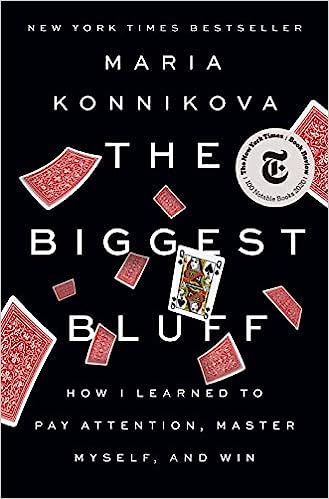This was also published on the MattPlaysChess Substack. Join me there!
I just finished reading The Biggest Bluff by Maria Konnikova. Konnikova is an author and psychologist who takes on the challenge of learning professional poker as a way to better understand luck and decision making. Even after the book was published she is still playing professional poker.

Summary
“The Biggest Bluff” is a captivating exploration of the unexpected intersections between psychology, decision-making, and the world of high-stakes poker. Through her personal journey, Konnikova not only delves into the intricacies of the game but also provides readers with valuable insights into human behavior and the art of decision-making. The narrative follows her transformation from a novice player with minimal knowledge of poker to a skilled professional who navigates the competitive landscape with finesse.
Konnikova’s skillful storytelling not only keeps readers engaged but also allows them to vicariously experience the highs and lows of the poker world. As she immerses herself in the game, readers are treated to an insightful analysis of the psychological aspects that drive both players and decisions at the poker table. The book’s unique blend of personal anecdotes, strategic insights, and psychological observations makes it a compelling read for both poker enthusiasts and those interested in understanding the nuances of human behavior.
One of the book’s strengths lies in its ability to bridge the gap between poker and everyday life. Konnikova masterfully illustrates how the principles of poker can be applied to decision-making outside of the game. From managing uncertainty to understanding the interplay of luck and skill, the book offers a thought-provoking perspective on making informed choices. “The Biggest Bluff” transcends its poker-centric premise to become a guide for embracing uncertainty and leveraging strategic thinking in various facets of life.
Poker? Or is it really about Chess?
No, obviously it is really about poker. However, I don’t play poker. I play chess. And I think about chess all the time. So when I’m reading a book like this, I think about how the lessons Konnikova learned in the poker world could apply to my learning chess. I think the two games are surprisingly similar.
My Chess Takeaways
Embrace Challenges: Similar to poker, facing strong opponents and difficult situations in chess is an opportunity for growth. Don’t shy away from challenging games, as they can reveal your true strengths and areas for improvement.
Balance Skill and Luck: Understand that chess involves a combination of skill and luck, especially when facing unexpected moves or positions. Focus on refining your skills through practice and study, so you can make the most of the opportunities that arise.
Maintain Composure: In chess, as in poker, maintaining composure during both favorable and challenging moments is essential. Keeping a clear mind under pressure allows you to make better decisions and capitalize on your opponent’s mistakes.
Self-Evaluation: Regularly assess your performance objectively. Review your games to identify your strengths and weaknesses. This self-awareness will guide your efforts to improve and refine your strategies.
Balance Knowledge and Experience: Learning chess theory is important, but practical experience is equally crucial. Applying what you’ve learned in actual games will help you understand the nuances and dynamics of different positions.
Reflective Thinking: Develop the habit of pausing to think through your moves carefully. Reflect on the potential outcomes and consider alternative moves. This deliberate decision-making can lead to better choices on the board.
Transitioning Challenges: When transitioning from comfortable openings to unfamiliar ones, or with new types of endgames, middle games, etc, expect a learning curve. Like in poker, gradually expose yourself to new positions and strategies to adapt more effectively.
Limit Emotional Influence: Just as emotions can cloud judgment in poker, they can affect your chess decisions. Learn to manage your emotions, so you can analyze positions objectively and avoid making impulsive moves.
Loss and Learning: Similar to poker, losses in chess can be stepping stones to improvement. Analyze your defeats to identify patterns and mistakes, ultimately contributing to your long-term success.
Continuous Learning: Chess is a game of constant learning and improvement. As you advance, your understanding of the game’s complexities will deepen, leading to greater awareness of your strengths and weaknesses.
Progressive Improvement: Apply the inchworm analogy to your chess skills. Continuously strive to move your “C game” (weakest skills) to your “B game” (average skills), and elevate your “A game” (peak performance) by refining your strategies and techniques.